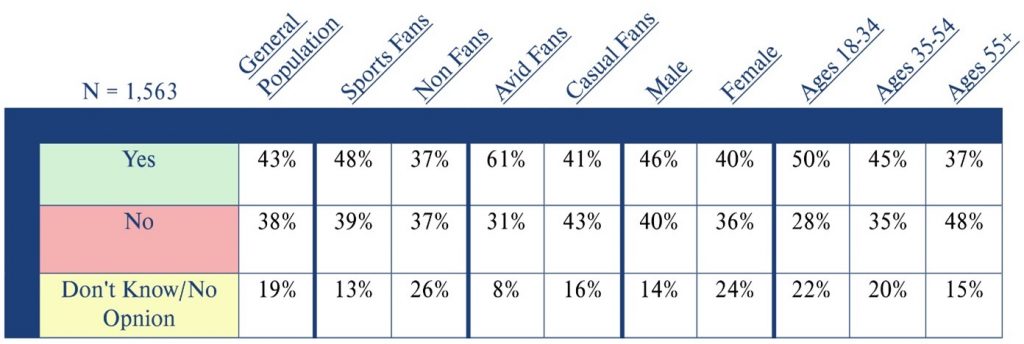By a 3 to 1 margin, Americans Support Presidential Win Over Winning a Sports Championship
- Americans reject mixing their politics and sports
- Political ads are unpopular with sports fans
- Social justice activism by players and teams is more popular than politics
 By a landslide margin of 60% to 19%, Americans would rather their Presidential candidate win the November 5th Presidential election than their favorite sports team or athlete win a championship this year. This indicates that politics and sports often do not mix.
By a landslide margin of 60% to 19%, Americans would rather their Presidential candidate win the November 5th Presidential election than their favorite sports team or athlete win a championship this year. This indicates that politics and sports often do not mix.
These are the findings within a Seton Hall Sports Poll conducted October 24-28 among 1,500 adults across the country. The poll, which is sponsored by The Sharkey Institute within Seton Hall University’s Stillman School of Business featured a national representative sample from YouGov Plc. weighted on U.S. Census Bureau figures for age, gender, ethnicity, education, income and geography and has a margin of error of +/-3.0 percent.
I would rather that my favorite team/athlete win their respective championship (e.g., World Series, Super Bowl, college national championship, etc.) than the Presidential candidate I support win in the November 5th, 2024 election.

**Note: Combined Results of AZ, GA, MI, NV, NC, PA, WI
*Note: Avid + Casual Fans
Further insights from this question include:
- The 3 to 1 margin holds for the general population, sports fans and non-sports fans
- Even avid fans prefer their Presidential candidate over their favorite team or athlete
- People over 55 are more extreme in favor of the Presidency (5:1 margin) than those 18 to 34 (2:1 margin)
To further support the revelation that politics and sports often do not mix, the Seton Hall Sports Poll asked participants if they spent more time following sports news than political news since Labor Day weekend. By a 2 to 1 margin, 51% disagreed while only 25% agreed.
Since Labor Day weekend, I spent more time following (e.g., attending, watching, reading, etc.) sports news than political news.

Further insights from this question include:
- Only avid sports fans are watching more sports (2:1 margin)
- Young people 18 to 34 split evenly between sports and political news
- People over 55 are more deeply into politics (3.5:1 margin)
“This is billed as a once in a lifetime presidential campaign in a season when the focus of those who normally watch more sports shifts to the Presidency,” said Charles Grantham, Director of the Center of Sports Management in the Stillman School of Business at Seton Hall University. “In the last two months it is no surprise that while the sports audience grows, the political audience demonstrably is greater when there is such a divide in the political landscape.”
Most Fans Oppose Their Teams and Athletes Voicing Their Politics
While the Presidency is paramount, when it comes to their professional teams and athletes, the population neither wants to hear the political views of those they follow nor cares if the political views of those they follow align. There is a distinct separation of how the fans care about the Presidential election as most of them do not want to hear politics from their sports teams and athletes.
It bothers me when professional teams and athletes vocalize their political views.
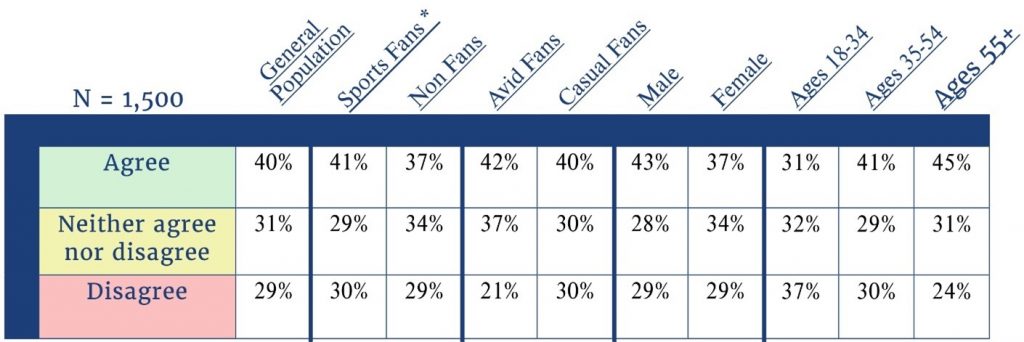
Further insights from this question include:
- Both the general population and sports fans oppose their athletes’ and teams’ political views (41% vs. 30%)
- Avid sports fans oppose political views twice as much (42% vs. 21%) as do older fans (45% vs. 24%)
- Only young people 18 to 34 support their athletes’ and teams’ political views (37% vs. 31%)
I want my favorite team/athlete to represent my political viewpoint.
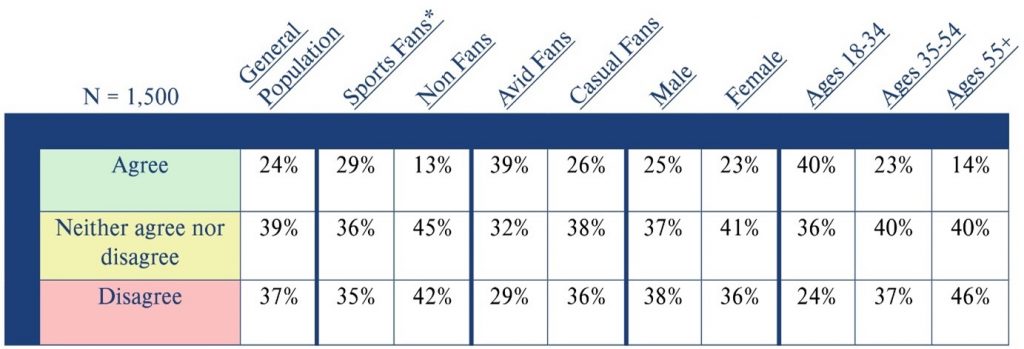
Further insights from this question include:
- The general population doesn’t care about their favorites’ politics (37% vs. 24%)
- Avid sports fans want their team or athletes to represent them politically (39% vs. 29%)
- Young people 18 to 34 strongly want to agree with their favorite athlete (40% vs. 24%)
Why Bother? By 4:1, Political Commercials Are a Turn-Off During Sporting Events
Sports fans are telling all parties not to waste their money on political commercials during sporting events. In one of the most decisive results of this poll, 61% of the general population is unpersuaded by political ads in sporting events. To reiterate, 61% disagree and 15% agree. Also considered ineffective is whether sporting events are appropriate venues to promote political causes where there is a 16 point difference (45% vs. 29%) believing they are not.
I am persuaded by political commercials that are played during sporting events.
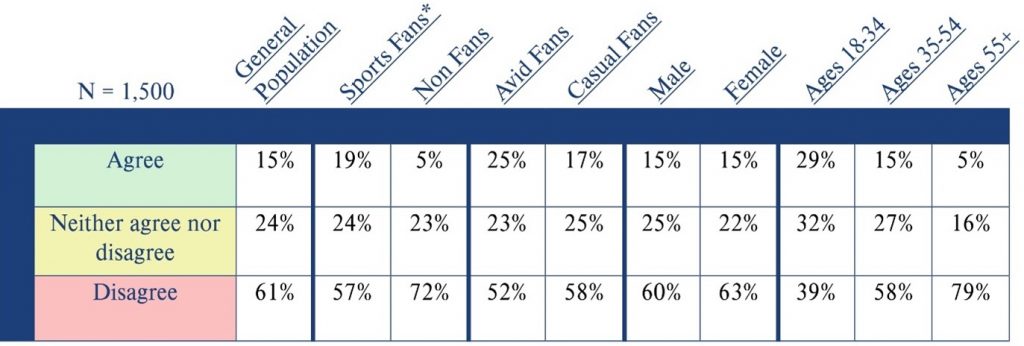
Further insights from this question include:
- Not one sub-group supports commercials, including 18 to 34 (39% vs. 29%)
- Even most avid sports fans are unpersuaded by commercials (52% to 25%)
- Non-sports fans and fans 55+ detest political commercials (15:1 margin)
Sporting events are an effective way to promote political causes.
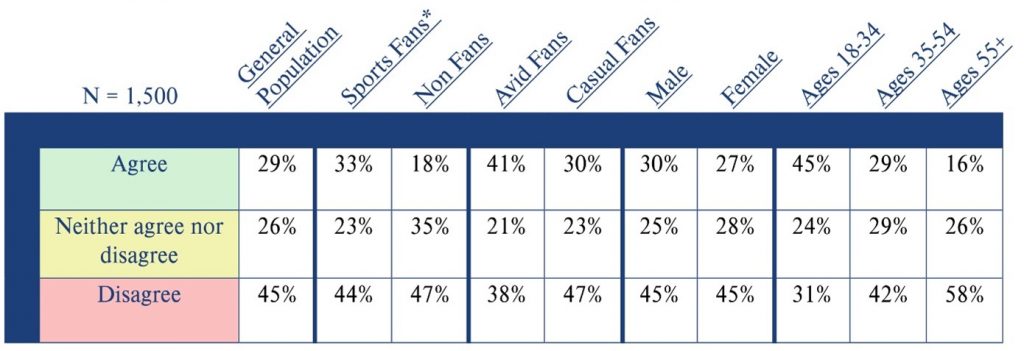
Further insights from this question include:
- General population opposes using sporting events by 16 points (45% vs. 29%)
- Young people 18 to 34 are the exception supporting sport venue use (45% vs. 31%)
- Avid fans slightly favor the use of sporting events for politics (41% vs. 38%)
By More Than 2 to 1 Margin, Fans Favor Sports Affecting Social Change by Their Teams and Athletes, but Not by Their Governments
Social justice is alive and well for players and teams. While the Presidential election and politics produce a wide spectrum of results in the current poll, the support for athlete and team activism affecting social change remains universal. The numbers are consistent where approximately 47% of the general population, males and females all support their teams and athletes affecting social change. In addition, the support for avid fans and 18 to 34 is above 60%.
Should athletes and/or player associations use their influence to affect social change?
October 2024:

April 2021:

Further insights from this question include:
- More than half of sports fans support social change activism by athletes and their unions
- There is unanimity among gender and age groups to support social change by players
- Opposition in the general population to athlete activism has declined by 14 points since April 2021 (35% vs. 21%)
Should sports organizations such as leagues and teams use their influence to affect social change?
October 2024:
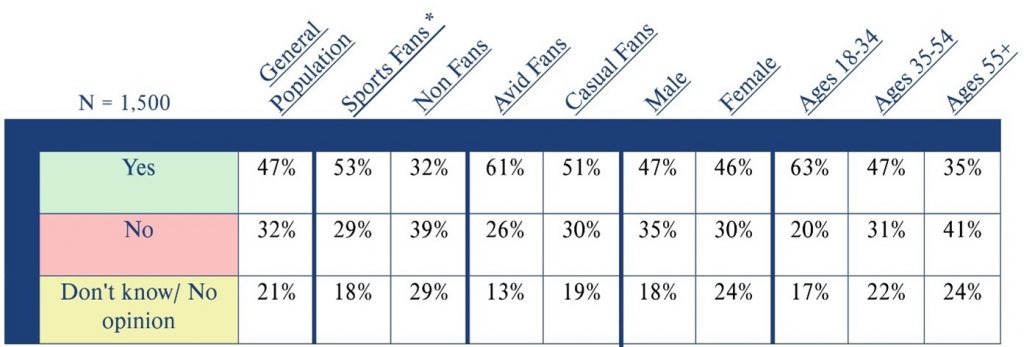
April 2021:

Further insights from this question include:
- General population backs teams by a 2.5:1 margin to affect social change (44% vs. 17%)
- Young people 18 to 34 back teams’ involvement by a 4.5:1 margin (60% vs. 13%)
- Opposition to leagues’ and teams’ social activism has declined by more than half in three years (General Population 2021 36% v. 2024 19%)
Should governments use sporting events to influence or affect social change?
October 2024:
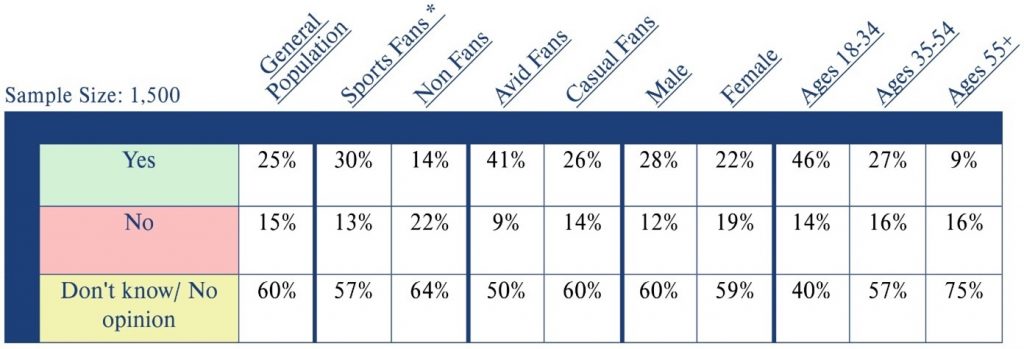
April 2021:
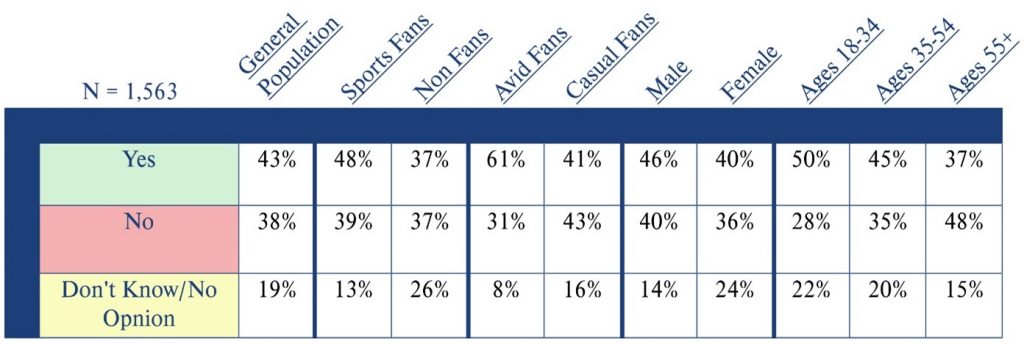
Further insights from this question include:
- Support for government influencing social change in the general population with sporting events is cratering (43% vs. 25%)
- People 55+ are most adamant in opposition (2024 9% vs. 2021 37%) to government using sporting events for political reasons
- One concludes that the general population demonstrates more public trust in their athletes and teams versus their governments
“The Poll reflects that the American public is engaged and precise about our sports,” says Daniel Ladik, Marketing professor in the Stillman School and Methodologist of the Seton Hall Sports Poll. “While the Presidency is paramount, we also see how fans value social change and are wary of who engages in it. Sports plays an expanded role in our culture as per the evidence in this Seton Hall Sports Poll and we look forward to further researching this topic in 2025.”
###
ABOUT THE POLL
The Seton Hall Sports Poll, conducted regularly since 2006, is performed by the Sharkey Institute within the Stillman School of Business. The poll is run by Charles Grantham, Professor of Sport Management and former Executive Director of the National Basketball Players Association. Professor Daniel Ladik is the Methodologist for the Seton Hall Sports Poll, and Associate Professor Marketing in the Stillman School of Business at Seton Hall University. Len DeLuca is the associate director for the poll. The SHSP aims to explore a broader overview of sports issues including the Ethics of Sport, the Culture of Sport, and the Business of Sport. This poll was conducted online by YouGov Plc. using a national representative sample weighted according to gender, age, ethnicity, education, income and geography, based on U.S. Census Bureau figures. Respondents were selected from YouGov’s opt-in panel to be representative of all U.S residents. This poll release conforms to the Standards of Disclosure of the National Council on Public Polls. The Seton Hall Sports Poll has been chosen for inclusion in iPoll by Cornell’s Roper Center for Public Opinion Research and its findings have been published everywhere from USA Today, ESPN, The New York Times, The Wall Street Journal, Washington Post, AP, and Reuters to CNBC, NPR, Yahoo Finance, Fox News and many points in between.
Media: Laurie Pine, Director of Media Relations, Seton Hall University (973) 378-2638; (973) 902-8060
Daniel Ladik, Ph.D., Chief Methodologist – daniel.ladik@shu.edu
October 2024 Seton Hall Sports Poll Results FINAL
Daniel Ladik, Ph.D., Chief Methodologist – daniel.ladik@shu.edu
This Seton Hall Sports Poll was conducted from October 25th to 28th and includes responses from 1,500 U.S. adults with a margin of error of +/- 3.0%. The sample mirrors the U.S. Census percentage on age, gender, income, education, ethnicity, and region.
Q1. Which of the following statements best describes you?

Election Day is Tuesday November 5th. To what extent do you agree or disagree with the following statements?
Q2a. I would rather that my favorite team/athlete win their respective championship (e.g., World Series, Super Bowl, college national championship, etc.) than the Presidential candidate I support win in the November 5th, 2024 election.

**Note: Combined Results of AZ, GA, MI, NV, NC, PA, WI
*Note: Sports Fans = Avid + Casual Fans
Q2b. Since Labor Day weekend, I spent more time following (e.g., attending, watching, reading, etc.) sports news than political news.

Q2c. It bothers me when professional teams and athletes vocalize their political views.
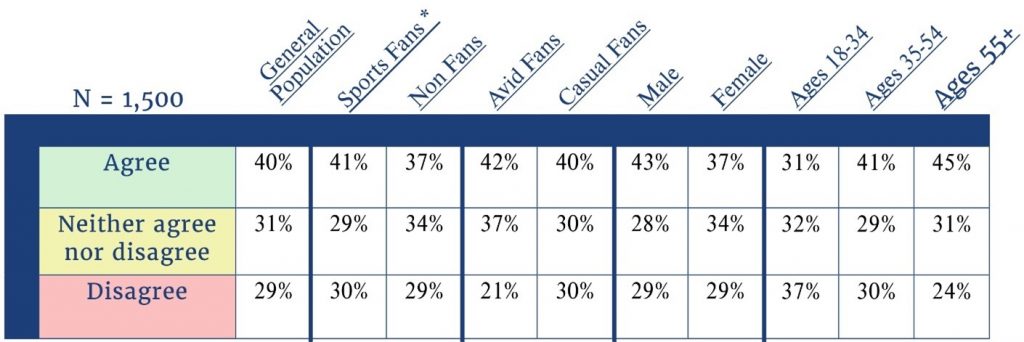
Q3a. I want my favorite team/athlete to represent my political viewpoint.
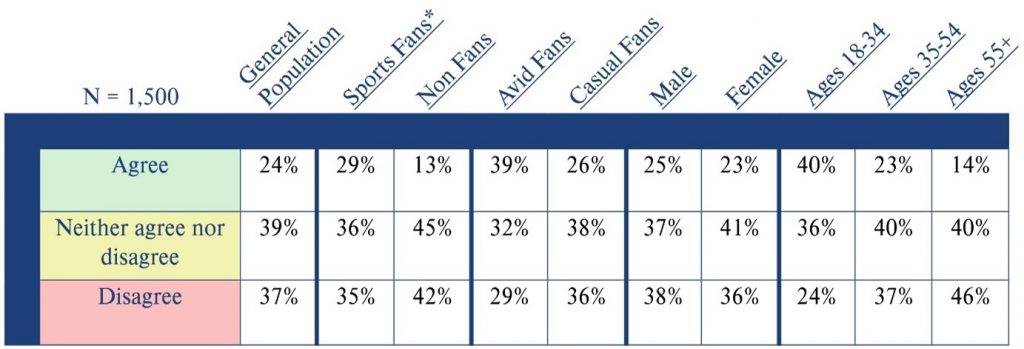
Q3b. I am persuaded by political commercials that are played during sporting events.
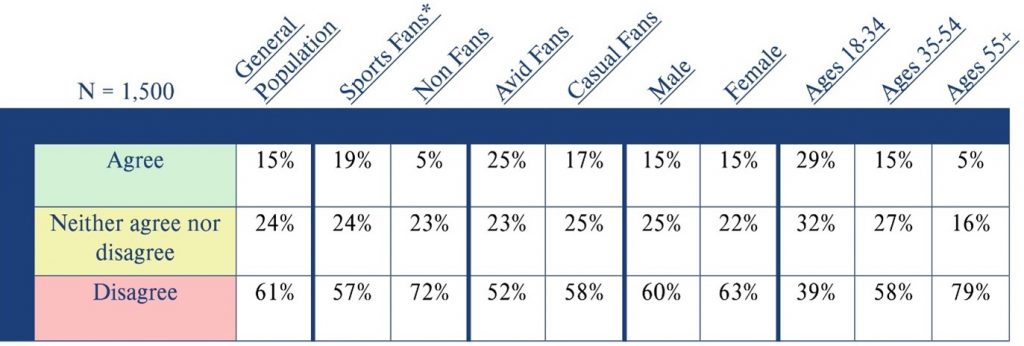
Q3c. Sporting events are an effective way to promote political causes.
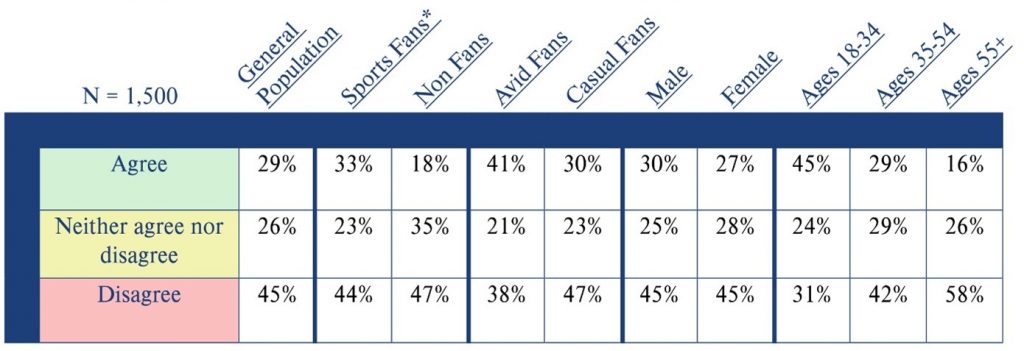
In sports, professional athletes and teams have used their platform to voice their opinions on social causes.
Q4a. Should athletes and/or player associations use their influence to affect social change?
October 2024:
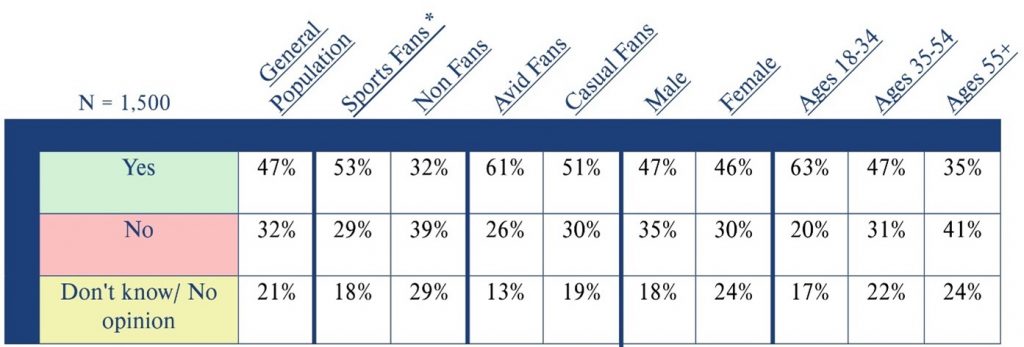
April 2021:

Q4b. Should sports organizations such as leagues and teams use their influence to affect social change?
October 2024:
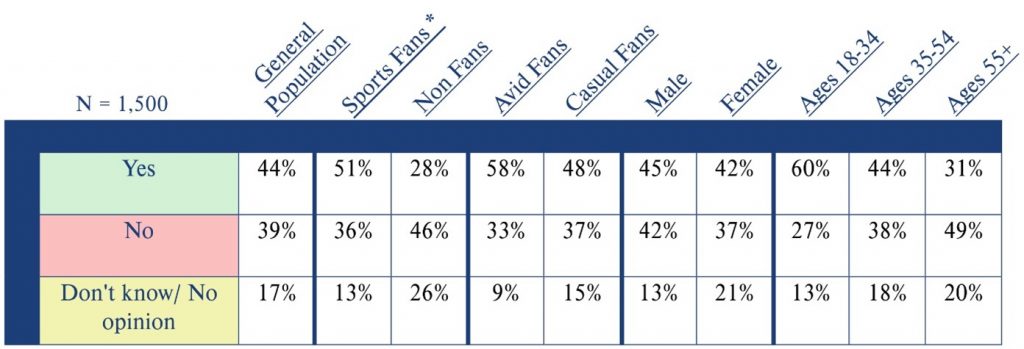
April 2021:

Q4c. Should governments use sporting events to influence or affect social change?
October 2024:
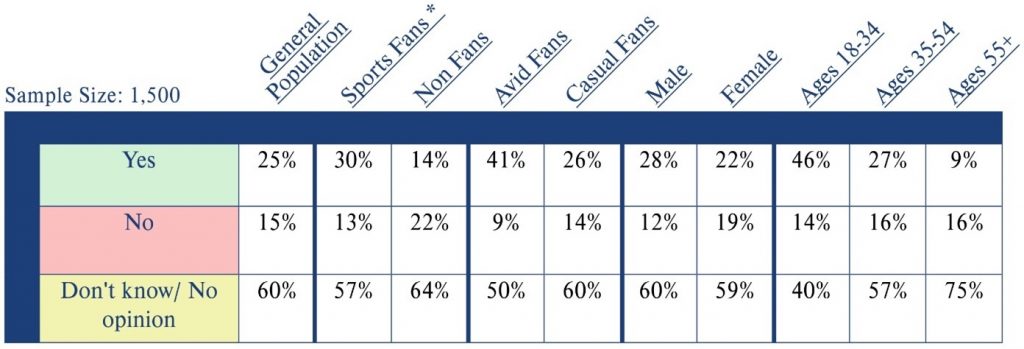
April 2021:
